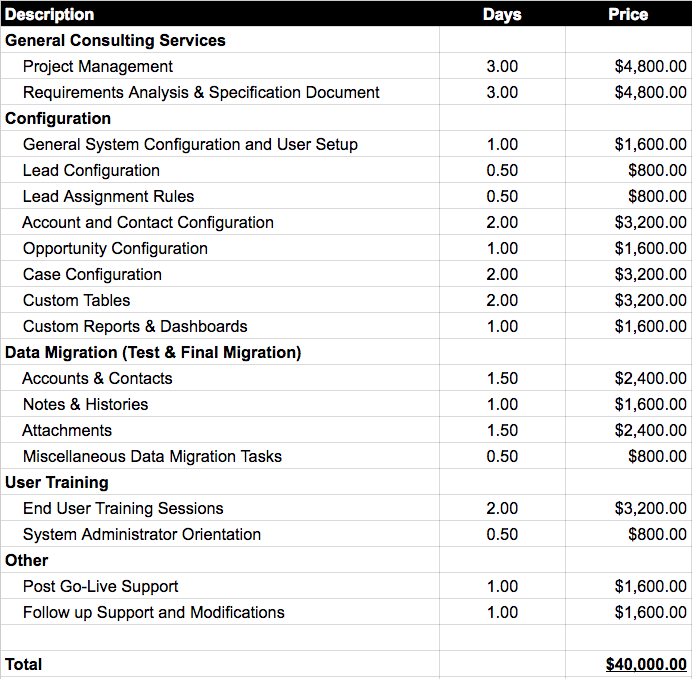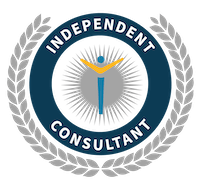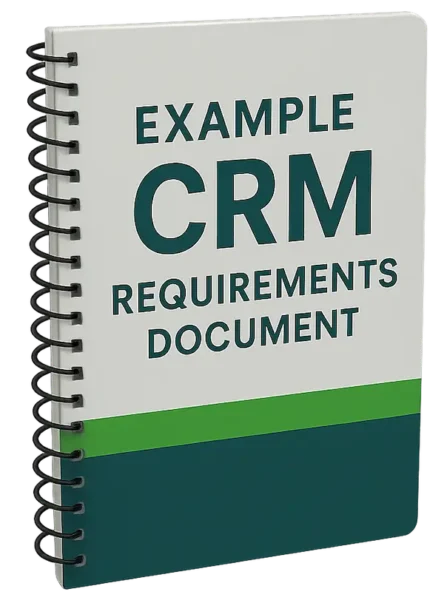CRM user license costs are only part of the initial cost of a CRM system. Another cost is CRM professional services.
Some companies decide to self-implement their CRM system. This is usually because there are people in-house who provide a combination of CRM-related business analysis experience and the right level of technical aptitude to manage tasks ranging from system configuration to data migration.

Many companies look to third parties to perform some or all of their CRM implementation.
Unlike the cost of CRM user licenses, CRM services are not based on straightforward unit pricing.
There is an extensive range of what organizations pay for CRM professional services. Some companies use CRM with minor changes to the systems’ out-of-the-box configuration.
Other companies consolidate functionality from multiple legacy database systems into their CRM system and develop custom integrations. These companies can end up spending well into five figures over time.
Part of determining how much is spent on CRM professional services is how malleable the platform is. Often, a new entrant to the CRM space will have limited configuration and customization options. As the system matures, the configuration and development possibilities become more extensive.
There are several ways that service providers can quote CRM professional services.
Flat Rate CRM Professional Services
CRM implementation firms sometimes quote a flat rate for what is variously called a QuickStart or a JumpStart package. The CRM vendor will tightly define the deliverables to protect themselves from scope creep. There may be a limit on the number of custom fields. It could be a defined number of training hours.
A QuickStart package can range from $5,000 to $10,000, depending on what’s included.
This quote type can appeal to a CRM customer, as it’s very predictable on the surface. Remember that any service work outside the QuickStart’s parameters typically requires a change order.
A QuickStart-type package generally works best for smaller organizations. Mid-market companies and enterprises usually don’t fit into a QuickStart box.
Time and Materials Estimate
Even though there aren’t materials involved with implementing a CRM system, as with remodeling a house, the term “T&M” is often used for quotes that aren’t fixed prices.
A T&M estimate is usually crafted after one or more conversations.
Sometimes, the CRM customer will first define and document their business or functional requirements.
The more detailed the requirements are upfront, the more likely the CRM services vendor will be to provide what turns out to be an accurate estimate.
This sample template was our starting point for estimates when we were in the CRM implementation business. We would estimate the level of effort for each task based on what we knew to that point. Invariably, there would be a “rob Peter to pay Paul” factor, as some functions took less time than expected and others took more time.

All professional service organizations have their style regarding how detailed they are in pricing and describing the services they will deliver.
Some professional services organizations charge the same rate for any consulting service, whether business analysis, system architecture, custom programming, or training.
Other organizations vary the rate based on the type of service or skill set. A senior consultant may command a higher hourly rate than a junior consultant.
A Pre-Purchased Block of Services
Specific CRM professional services organizations will sell a block of consulting hours at a reduced hourly rate. For example, if their standard hourly rate is $200, they may sell a 20-hour block for $3,600.
This is most useful after the initial CRM implementation when a series of ongoing requirements come up — but it’s not known in advance exactly what those requirements will be.



